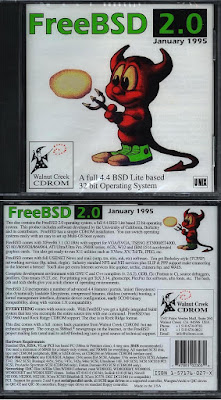Sunday, August 28, 2016
The Importance of BSD
The Berkeley Software Distribution (BSD) is a Unix operating system developed by the Computer Systems Research Group (CSRG) of the University of California, Berkeley.
The BSD operating system started as an add-on package for Unix v6 released in March 1978. There was a 2nd version which was used as an add-on package for Unix v7 which was released in May 1979. Version 2 or 2BSD as it is usually called included the ex/vi text editor created by Bill Joy. The sendmail program appears in 2BSD for the first time.
In 1979 3BSD was released which was an improvement over the Unix 32V port to Vax 11/780. This was the first stand-alone version of BSD. The kernel was named vmunix (virtual memory Unix) and was 132016 bytes in size. Utilties such as whereis, uptime, and berknet appeared for the first time. Surviving disk images of 3BSD also included an APL interpreter and Lisp.
In 1983 we saw 4.2BSD appear with TCP/IP utilties and the new Berkeley Fast File System.
Unfortunately it wasn't until the Intel 80386 CPU arrived that a port of BSD to inexpensive PCs became possible. In 1992 William and Lynn Jolitz released 386BSD. Before this we had proprietary Unixes which could run on IBM PCs and Intel 80286 CPUs such as Venix and Xenix, but the user had no access to the source code.
By 1993 Walnut Creek was offering ftp access and CDROMs with FreeBSD on them. In 1995 FreeBSD 2.0 was released which included many GNU utilties, XFree86 3.1 and many TCP/IP networking services. Best of all, everything came with the source code.
The importance of BSD is undeniable: It vastly improved Unix with the addition of ex/vi, internet capabilities and many other enhancements. Nowadays we are fortunate to have three main branches of BSD: NetBSD, FreeBSD and OpenBSD. These certainly are the first choices for the Unix traditionalist. My own preference is to use OpenBSD.
Subscribe to Comments [Atom]


Post a Comment